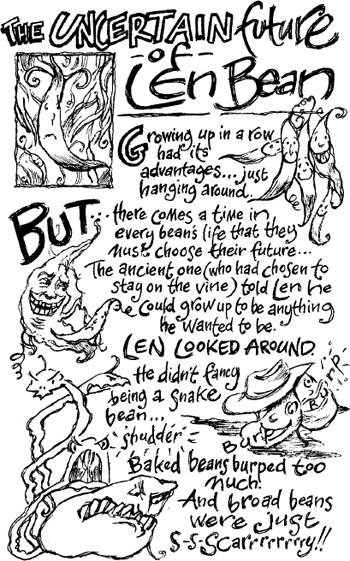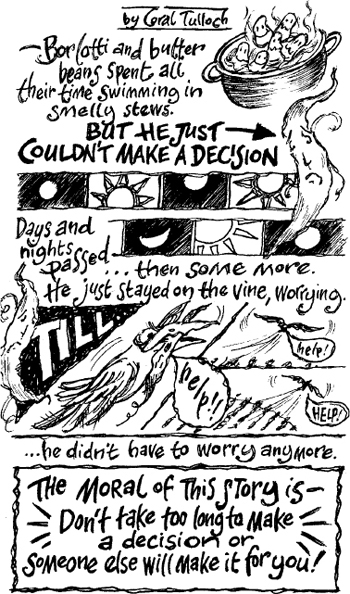
I wasn't sure what the difference between doves and pigeons was, but I decided they were doves because it sounded more romantic.
They were perched in the bare branches of a tree in the front garden, cooing.
I thought it was strange, because everything else in the garden looked so bare and empty from the street. The trees and bushes were all bare. The lawn was dead. The day felt grey and cold.
The gate was stuck closed. I had to lean my whole weight against it and shove hard before it finally gave way with a rusty groan.
The path clearly hadn't been swept for a long time. I guessed that the family must use a back entrance – no one had been in this garden for a while.
There was some kind of strange optical illusion in the garden, because the veranda of the house looked quite close from the gate, but it took me a long time to reach it. As I drew closer to the house, I shivered. It was old and weary-looking, all dilapidated and sad and colourless. The windows had faded curtains drawn across them. The patchwork shingles on the roof seemed to shiver in the cold afternoon.
As I stepped onto the veranda, the doves all took off with a loud flapping. I jumped. Then everything was quiet. A single grey feather drifted down from the tree, the only sign that they were ever there.
There was a doll's house on the veranda. Its little windows had been smashed, the banisters snapped, and the wallpaper torn. There wasn't any furniture inside.
There wasn't a doorbell, so I knocked. The dense wooden door seemed to eat the rapping noise, and I wondered if anyone inside could have heard. I waited.
Finally, I heard the patter of little feet on floorboards. They came right up to the door, then there was a pause.
The door opened.
Two little girls stood before me. They were maybe four and six. They wore plain, old-fashioned dresses, with no shoes. Both had long yellow hair that hung down around their shoulders. They stared at me.
‘Hi,’ I said. ‘Is your mum home? I'm your new babysitter.’
The two little girls looked at each other.
‘You're late,’ said the older one. Her voice was husky and soft. ‘Mummy's already gone. She says you're to look after us until she gets back.’
The younger one nodded.
‘Okay,’ I said. ‘My name's Kumuda.’
‘I'm Jenny,’ said the older girl. ‘And this is Nell.’
The younger girl opened her mouth. Her teeth had a greenish tinge, and I wondered if they'd been eating lollies.
‘Kumuda is a funny name,’ she said, her voice high and reedy.
‘It's Indian,’ I said. ‘It means “lotus flower”.’
The two girls were quiet again and stared at me.
‘May I come in?’ I asked.
They both nodded, and stood aside. Jenny pointed to a hatstand.
‘You can hang your bag there,’ she said.
The house seemed much larger inside than it did from outside, although it felt warm and cosy. The floorboards were golden brown, like honey. The walls were painted a rich burgundy, but the dark colour didn't feel oppressive. As I followed the girls down the hallway, I peered through doors that led into large, well-furnished rooms. Everything looked old-fashioned and expensive. An iron staircase wound up out of sight, and I looked up, puzzled. I didn't remember seeing a second storey from the outside.
‘When's your mum coming back?’ I asked the girls, but they didn't answer.
Jenny opened a door and led me into a bright, open kitchen with a slate floor and huge windows looking out onto the back garden. I stopped, astonished. The garden was full of sunlight and colour. Trees hung low with fruit and bright green foliage. Flowers exploded from their beds, and clambered up the high stone wall at the back of the garden. I could see the doves perched around a large stone birdbath, cooing happily.
In the very centre of the garden was a large pond, with a weeping willow leaning over it so the tips of its fronds brushed the surface of the water. The pond had strange green gunk floating on the top. I wondered if it was a sort of algae or something. The pond was the only part of the garden that didn't look perfectly manicured and bright. There was something wild about it, although I supposed it must have been man-made.
‘What an amazing garden,’ I said. ‘The front of the house is so bare.’
‘We never go to the front garden,’ said Nell.
I turned to the girls. ‘Well? What do you guys want to do?’
Nell glanced at Jenny.
‘We want to play a game,’ Jenny said.
I smiled at them. ‘What sort of game?’ I asked. ‘Do you have any board games?’
Nell shook her head. ‘Hide and seek,’ she said.
‘Great!’ I said. ‘Shall I be It?’
Jenny shook her head. ‘It will be too hard for you,’ she said. ‘Because you don't know the house yet. You should hide, and we'll find you.’
‘Okay,’ I said. ‘Can you count to a hundred?’
‘We can count forever,’ she said. I wondered if they ever smiled, and realised they must be shy in front of new people.
‘Right,’ I said. ‘Close your eyes, and no peeking.’ They turned to face each other, and covered their eyes with their hands.
‘One … two … three …’
I turned and went back into the hallway. I wanted to climb that little iron staircase. The treads were very narrow, so I had to climb on my tiptoes. The banister was cool under my hands, but after climbing past a few turns, I grew dizzy. By the time I reached the top I was out of breath, and feeling a little ill.
I could hear the girls counting back in the kitchen.
‘Seven … eight … nine …’
There was a long corridor at the top of the stairs, with doors leading off on both sides. I followed it for a while, trying the doors, but they were all locked. The house was so enormous – it made sense to close off some of the rooms.
The walls felt very thin, because I could still hear Jenny and Nell.
I finally found an unlocked door. It opened into a bedroom that I thought might belong to the girls. A large bed sat in the middle of the room, neatly made with a floral bedspread. I couldn't see any soft toys or dolls anywhere, or even any books. I would have thought it was an adult's room, except I saw two pairs of little black shoes lined up neatly beside the bed.
‘Twenty-two … twenty-three … twenty-four …’
There was another door in the room. I thought it must be a walk-in wardrobe, and opened it, looking for a good hiding place. As a seasoned babysitter, I knew I needed somewhere that was not too easy, not too hard. A delicate balance.
It wasn't a wardrobe. It was another room – I would have called it a playroom if there'd been anything to play with in it. There was a large mirror leaning against one wall, and an enormous chest in the corner. The chest was easily big enough for me to fit into, so I walked over to it.
‘Thirty-seven … thirty-eight … thirty-nine …’
As I passed the mirror, I caught a glimpse of my reflection. The light in the room was unflattering, and I winced. I looked terrible. My hair was flat and limp, my skin looked sallow. I peered closer and noticed crow's feet forming in the corners of my eyes. I didn't realise wrinkles started so early.
The lid of the chest was heavy and I struggled to open it.
The first thing that struck me was a strong smell of leather. I looked into the chest and frowned.
‘Fifty … fifty-one … fifty-two …’
It was full of handbags. There were probably about fifty in there, all different styles and shapes. It seemed like an odd thing to collect, and an odder thing to store in a children's bedroom. Surely collectors like to have their items on display in glass cases?
I picked up one of the handbags – brown leather with a bronze buckle – and heard a jingling. I undid the buckle and lifted the flap.
It looked like a normal handbag. Keys, a leather purse, a handkerchief, a lipstick. But what was it doing in this chest?
‘Sixty-five … sixty-six … sixty-seven …’
I opened the purse, and found old paper banknotes that I'd never seen before. I pulled out one of the cards. It was a driver's licence belonging to someone called Belinda Simm. The date on it was 1965.
I dropped the bag and the wallet and fished out another – black patent leather, gold clasp.
The purse inside belonged to a Katy Gibson, 1983.
I pulled out a pale green bag. The leather felt like it was about to fall apart. There was a matching purse inside which contained a few old-fashioned coins, but no driver's licence or credit card or anything. I dug through the bag. It smelled like dust. I found a scrap of yellow newspaper. The edges crumbled away when I touched them, and I held it carefully.
It was an advertisement.
Babysitter required two nights a week. Excellent pay. References essential. Contact Mrs Green by telephone, number Green-342.
I shivered. The ad was almost identical to the one I'd answered. Only the telephone number was different. I looked at the date in the corner of the page.
‘Eighty-nine … ninety … ninety-one …’
It said 1914.
I stared at the handbags, and thought suddenly of my own bag, hanging on the hatstand in the hallway. I turned and ran from the room.
I stumbled down the staircase, which made a horrific clanging noise.
My handbag was gone. My heart was hammering so hard I could barely breathe. I looked back towards the kitchen, but the girls weren't there any more. The glass door that led to the back garden was open, and there was a strong smell of mud, and something sort of fishy and rotten. I could still hear the girls counting, even though I couldn't see them.
‘Ninety-eight … ninety-nine …’
I pulled on the heavy front door, but it wouldn't open. I tried the handle. Nothing. I pushed, pulled, shoved. It wouldn't budge.
‘One hundred.’
I spun around. Jenny and Nell were right behind me. They grinned, their teeth a dark, glistening green, like the green gunk on the surface of the pond. I noticed their bare feet were wet, and that they'd both left a trail of muddy footprints up the hallway.
I backed away from them, until I was flat up against the door.
‘Found you,’ said Jenny.

